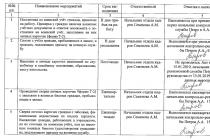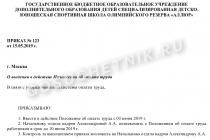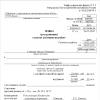There are two parties involved in public competition obligations:
The person who organized the competition (announced the competition);
Persons participating in the competition, including those who won this competition (fulfilled the conditions presented).
Public competition with an obligation to pay an award
Article 1057 of the Civil Code of the Russian Federation establishes that a person who has publicly announced the payment of a monetary reward or the issuance of another award (the payment of an award) for the best performance of work or the achievement of other results (public competition) must pay (give out) a conditional award to someone who, in accordance with conditions of the competition is recognized as its winner.
A public competition must be aimed at achieving some socially useful goals.
A public competition may be open or closed.
A public competition is open when the offer of the organizer of the competition to take part in it is addressed to everyone by an announcement in print or other means. mass media. Wherein open competition may be due to the preliminary qualification of its participants, when the organizer of the competition conducts a preliminary selection of persons who wish to take part in it.
A public competition is closed when an offer to take part in the competition is sent to a certain circle of persons at the choice of the organizer of the competition.
The announcement of a public competition must contain conditions that provide for the essence of the task, the criteria and procedure for evaluating the results of work or other achievements, the place, term and procedure for their presentation, the amount and form of the award, as well as the procedure and terms for announcing the results of the competition.
Public competition with the obligation to conclude a contract
Paragraph 5 of Article 1057 of the Civil Code of the Russian Federation establishes that the rules of Articles 447449 of the Civil Code of the Russian Federation on the conclusion of a contract at an auction and on the organization and procedure for conducting an auction are applied to a public tender containing an obligation to conclude an agreement with the winner of the tender.
Article 447 of the Civil Code of the Russian Federation provides that an agreement may be concluded by holding an auction, in which case the agreement is concluded with the person who won the auction.
The organizer of the auction may be the owner of the thing or the owner of the property right, or a specialized organization acting on the basis of an agreement with the owner of the thing or the owner of the property right.
Bidding may be held in the form of an auction or competition, in which more than one participant must participate.
The winner of the auction is the person who offered the highest price.
The person who, according to the conclusion of the tender commission appointed in advance by the organizer of the auction, offered the best conditions, is recognized as the winner of the tender.
Auctions and competitions can be open and closed.
Any person can participate in an open auction and open tender.
Only persons specially invited for this purpose participate in the closed auction and closed competition.
The notice of the auction must be made by the organizer at least 30 days before the auction and must contain information about the time, place and form of the auction, its subject and procedure, including registration of participation in the auction, determination of the person who won the auction, as well as information about starting price. If the subject of the auction is only the right to conclude a contract, the notice of the upcoming auction must indicate the period provided for this.
Bidders make a deposit in the amount, terms and procedure specified in the notice of the auction. If the auction does not take place, the deposit is refundable. The deposit is also returned to persons who participated in the auction, but did not win it. When concluding an agreement with the person who won the auction, the amount of the deposit made by him is counted towards the fulfillment of obligations under the concluded agreement.
The person who won the auction and the organizer of the auction sign on the day of the auction or competition the protocol on the results of the auction, which has the force of the contract. The person who won the auction, if he evades signing the protocol, loses the deposit he made.
The organizer of the auction, who avoided signing the protocol, is obliged to return the deposit in double size, as well as to compensate the person who won the auction for the losses caused by participation in the auction, in the part exceeding the amount of the deposit. If the subject of the auction was only the right to conclude an agreement, such an agreement must be signed by the parties no later than 20 days or another period specified in the notice after the completion of the auction and the execution of the protocol.
Reward
The decision on the payment of the award must be made and communicated to the participants of the public competition in the manner and within the time limits established in the announcement of the competition.
If the results indicated in the announcement are achieved in the work performed jointly by two or more persons, the reward is distributed in accordance with the agreement reached between them. If such an agreement is not reached, the procedure for distributing the award is determined by the court.
Reimbursement of expenses of participants of the competition
In the event of a change in the conditions of the competition or its cancellation, the person who announced the competition must reimburse the costs incurred by any person who performed the work specified in the announcement before he became or should have become aware of the change in the conditions of the competition and its cancellation.
However, the person who announced the competition shall be released from the obligation to reimburse expenses if he proves that the specified work was not performed in connection with the competition, in particular before the announcement of the competition, or knowingly did not meet the conditions of the competition.
Accounting
Accounting with the person who organized the competition
Accounting depends on the goals pursued by the organizer of the competition when it was announced:
If the purpose of the competition was to choose the best architectural project for the construction of a building or structure, the costs incurred are subject to reflection in the debit of account 08 " Capital investments»; at the same time, in cases where these costs are not provided for in the summary estimates of the cost of construction, they are subsequently not included in the initial cost of completed construction of fixed assets, but are charged to the developer's own funds: Dt 88 "Retained earnings (uncovered loss)" Kt 08 "Capital investments";
If the purpose of the competition was to choose the best option manuscript or other work of literature, art, science for subsequent commercial publication or distribution in another paid way, then the costs incurred are to be reflected in the debit of account 08 "Capital investments" with subsequent inclusion in the inventory value of an intangible asset (rights to use the corresponding works of literature, art, science ) with the obligatory execution of the corresponding author's or license agreement: Dt 04 "Intangible assets" Kt 08 "Capital investments".
However, if the relevant agreement has not been concluded and the right to commercial use of the work has not been transferred to the organizer of the competition, there is no need to talk about acquiring an intangible asset, so the only way out is to attribute all costs incurred to its own sources: Dt 88 “Retained earnings (uncovered loss)” Kt 08 "Capital investments";
If the purpose of the competition was to identify (or achieve) any results that are not related to production activities of the person who announced the tender, the costs incurred are subject to reflection in the debit of account 88 “Retained earnings (uncovered loss)”.
Based on the above accounting entries, the transfer of monetary amounts of the award and reimbursement of expenses to the winners (participants) of the competition are reflected as follows:
calculation of the amount to be paid (depending on the purpose and results of the competition):
Dt 08 "Capital investments" (88 "Retained earnings (uncovered loss)" Kt 76 "Settlements with various debtors and creditors";
transfer of the amount of the award (cash payment from the cash desk):
Dt 76 “Settlements with various debtors and creditors” - Kt 51 “Settlement account” (50 “Cashier”). When making payments to individuals It should be borne in mind that subparagraph “h” of paragraph 1 of Article 3 of the Law “On Income Tax” provides for a tax benefit for the full exemption from taxation of the value of “prizes in cash and in kind received at competitions and competitions during the year, not exceeding the amount of twelve multiple of the amount of the monthly wage established by law. When paying an award in an amount exceeding the established amount, income tax is withheld from the excess amount at the established rate scale. For example, in the letter of the Ministry of Finance of Russia No. 040406 it is explained that “if the winners International competitions receive prizes in cash and in kind, the value of these prizes in excess of twelve times the minimum monthly wage established by law shall be included in taxable income.
With regard to the calculation of mandatory insurance contributions to the Pension Fund of the Russian Federation, the same points should be noted that we stopped at when considering the obligations that arose with the public promise of the reward.
On the one hand, paragraph 14.9 of the resolution of the Board of the PFR No. 22 clarifies that the mandatory insurance premiums in the FIU should also be charged on the cost of “awards awarded in cash or in kind for prizes in competitions, reviews, competitions (sports, professional, artistic, internal factory, republican) and other similar events” in cases where such payments are accrued to the employee from the funds of the employer. A similar explanation is contained in paragraph 10 of the Resolution of the Board of the PFR No. 73.
On the other hand, paragraph 21 of the "List of payments for which insurance premiums are not charged in Pension Fund Russian Federation"It was established that mandatory insurance premiums to the Pension Fund of the Russian Federation are not charged on "remuneration paid to citizens under civil law contracts, excluding remuneration paid under contracts the subject of which is the performance of work or the provision of services, as well as excluding remuneration under copyright agreements." At the same time, in the letter of the PFR Board No. EB09 11/2147IN, it is explained that insurance premiums to the PFR should be accrued on remuneration paid to individuals under contracts the subject of which is the performance of work or the provision of services; at the same time, “contracts ... of a public competition cannot belong to this category.” A similar explanation is contained in the letter of the PFR Board No. EB1628/8929.
Thus, if an award is paid to an individual without proper documentation transactions that check from the FIU will inevitably raise the issue of accruing insurance premiums to the FIU for these payments and subject the organization to an appropriate fine.
However, even the proper written execution of a transaction for the payment of an award based on the results of a public competition does not guarantee against conflict with inspectors from the FIU. Therefore, when paying an award, it is necessary to draw up all documents in writing in strict accordance with the norms of civil law.
Accounting for contestants
In a competition with an obligation to pay an award
If the costs did not lead to victory in the tender, then all costs incurred are subject to reflection in the debit of account 88 "Retained earnings (uncovered loss)" as an unproductive distraction own funds.
If all expenses incurred by the tender participant are reimbursed by the organizer of the tender, in accordance with the established procedure, they must form the proceeds of the tender participant:
Accounting for all costs incurred Dt 20 "Main production" Kt 10 "Materials" (70 "Settlements with personnel for wages", 69 "Calculations for social insurance and security”, 60 “Settlements with suppliers and contractors”, etc.);
Calculation of the amount of reimbursement of costs to be received under the contract Dt 62 “Settlements with buyers and customers” - Kt 46 “Sale of products (works, services)”;
Allocation of VAT as part of revenue Dt 46 “Sales of products (works, services)” Kt 68 “Settlements with the budget” / sub-account “VAT settlements”;
Accrual of tax on road users - Dt 26 "General expenses" Kt 67 "Calculations on extra-budgetary payments";
Write-off of all expenses of the tender participant Dt 46 "Sales of products (works, services)" Kt 20 "Main production" (26 "General expenses", etc.); definition financial result(profit) Dt 46 "Sales of products (works, services)" Kt 80 "Profits and losses";
Dt 80 “Profits and losses” Kt 68 “Settlements with the budget” charging tax on the maintenance of the housing stock and social and cultural facilities;
Debt repayment by the organizer of the tender Dt 51 “Settlement account” - Kt 62 “Settlements with buyers and customers”.
In a tender with an obligation to conclude a contract
If the costs did not lead to the conclusion of the relevant agreement, all costs are subject to reflection in the debit of account 88 "Retained earnings (uncovered loss)" as an unproductive diversion of own funds.
If, however, as a result of the competition, a result is achieved - an appropriate agreement is concluded - then the amounts transferred to the organizer of the competition should be counted towards the deposit under this agreement.
At the same time, such expenses of the tender participant as payments “for the right to conclude” the relevant contracts, which were the subject of the tender (for example, real estate lease agreements), constitute a special category.
When analyzing such costs, the following should be noted. Firstly, by letters of the Ministry of Finance of Russia No. 040311 and No. 040311, the right to conclude a lease agreement land plot not subject to VAT. However, when realizing (reselling this right), VAT is applied to full price sales.
Secondly, the letter of the State Tax Inspectorate for the city of Moscow - No. 1113/9767 clarified that the "Regulations on the composition of costs" does not provide for the attribution to the cost of payment for the right to conclude land lease agreements. Therefore, "the transfer of funds to the settlement accounts of Moskomzem in the form of a fee for the right to conclude lease agreements is carried out at the expense of the profit remaining at the disposal of enterprises after taxes have been paid."
Thus, such payments “for the right to conclude an agreement”, which are subsequently not counted towards the deposit under the concluded agreement, are subject to accounting as follows: the actual transfer of payments - Dt 76 “Settlements with various debtors and creditors” Kt 51 “Settlement account »; attribution of expenses incurred at the expense of own funds - Dt 88 "Retained earnings (uncovered loss)" - Kt 76 "Settlements with various debtors and creditors".
The person who announced the tender sets the terms for holding this tender: the start date and the end date.
At the same time, Article 1058 of the Civil Code of the Russian Federation establishes that a person who has announced a public competition has the right to change its conditions or cancel the competition only during the first half of the period established for the submission of works. At the same time, notification of a change in the conditions or cancellation of the competition must be made in the same way as the competition was announced.
The person who announced a public competition must clearly define the place of the competition (or the place where the results of the competition are summed up). However, in the event of a reward being paid (both to an individual and to a foreign legal entity), the source of such income must make appropriate tax withholdings.
Use of the competition results
If the subject of a public competition is the creation of a work of science, literature or art and the conditions of the competition do not provide otherwise, the person who announced the public competition shall acquire preemptive right to conclude an agreement with the author of a work awarded a conditional award on the use of the work with the payment of an appropriate remuneration to him for this.
Return of the submitted works to the participants of the competition
The person who announced a public competition is obliged to return to the participants of the competition works that were not awarded, unless otherwise provided by the announcement of the competition and follows from the nature of the work performed (which in principle cannot be returned to the participant, for example, when holding a competition for the best sand sculpture on seaside beach).
public competition is a type of public promise of a reward. A person who publicly announced the payment of a monetary reward or the issuance of another award (about the payment of an award) for the best performance of work or the achievement of other results (the organizer), must pay (give out) a conditional award to the one who, in accordance with the terms of the competition, is recognized as its winner. A public competition must be aimed at achieving some socially useful goals.
Contest organizers can be any legal and (or) individuals, as well as state bodies and local governments. Circle of participants public competition is also not limited.
Types of public competition: open - when the offer of the organizer of the competition to take part in it is addressed to everyone by an announcement in the press or other media; closed - when an offer to take part in the competition is sent to a certain circle of persons at the choice of the organizer of the competition.
Form announcement of a public competition can be any.
The terms and conditions to be included in the bidding announcement divided into mandatory and optional.
Mandatory conditions include: information about the essence of the task (the subject of the competition); deadline for completing the task; the procedure for presenting works or other achievements; place of presentation of the work; criterion, procedure and term for comparative evaluation of works; amount of remuneration (premiums); procedure and deadline for the announcement of the results of the competition.
Optional conditions are specified at the free discretion of the organizer of the competition, and their number and nature depend on the characteristics of the competition.
Change of conditions and cancellation of the public competition: the person who announced a public competition has the right to change its conditions or cancel the competition only during the first half of the period established for the submission of works; notification of changes in the conditions or cancellation of the competition must be made in the same way in which the competition was announced; the person who announced the competition must reimburse the costs incurred by any person, cat. performed the work specified in the announcement before he became or should have become aware of the change in the conditions of the competition and its cancellation; the person who announced the competition shall be relieved of the obligation to reimburse expenses if he proves that the specified work was not performed in connection with the competition, in particular before the announcement of the competition, or knowingly did not comply with the conditions of the competition.
Competitive works that have not been awarded an award, the organizer of the competition is obliged to return to the participants immediately after the announcement of the results. Failure to fulfill this obligation gives the contestants the right to demand the return of their works, and in case of their loss or damage - compensation for damages.
- Section I Introduction to Civil Law
- The concept of civil law
- Concept, subject and methods of civil law
- Principles of civil law
- Sources of civil law. The effect of normative legal acts in time, space and circle of persons
- Civil law system
- Civil law as a science and academic discipline
- Section II civil legal relationship
- The concept, content and types of civil legal relations
- The concept and signs of civil relations
- The content of civil relations
- Types of civil legal relations
- Subjects of civil legal relations
- Citizens (individuals) as subjects of civil legal relations
- Civil legal capacity and legal personality
- Civil capacity. Subjective right and legal obligation
- Guardianship and guardianship. Patronage
- Name and place of residence of a citizen
- Recognition of a citizen as missing. Declaring a citizen dead
- Acts of civil status
- Legal entities as subjects of civil legal relations
- Formation, reorganization and termination of a legal entity
- Bankruptcy (insolvency) of a legal entity
- Kinds legal entities
- Russian Federation, subjects of the Russian Federation, municipalities as subjects of civil law
- Citizens (individuals) as subjects of civil legal relations
- Objects of civil rights
- The concept of the object of civil rights. Classification of things
- money and securities
- results creative activity. Information. Results of works and services. intangible benefits
- Grounds for the emergence, change and termination of civil legal relations
- concept legal facts
- Types and classification of legal facts
- Concept, types and form of transactions
- Conditions for the validity of transactions. The concept and types of invalid transactions
- Exercise and protection of civil rights
- Exercise of civil rights and performance of duties
- Civil rights protection
- Representation
- The concept and types of representation
- Power of attorney. Types of powers of attorney
- terms in civil law. Limitation of actions
- The concept and types of terms
- The running of the statute of limitations
- Section III Ownership and other rights in rem
- Real right and right of ownership
- The concept of property law
- General provisions about the right of ownership. Forms of ownership and forms of ownership
- Contents of ownership
- Acquisition and Termination of Ownership
- Features of the content of the property right of various subjects of civil rights
- Ownership of legal entities
- The right of state and municipal property
- Common property right
- Real rights of persons who are not owners. The right of economic management and the right of operational management. easements
- Protection of property rights and other property rights
- Ownership and other real rights to land
- Ownership and other real rights to residential premises
- Section IV Law intellectual property
- The right to the results of intellectual activity and means of individualization
- General Provisions on Intellectual Rights and Intellectual Property
- Exclusive rights to the results of intellectual activity
- Civil Law Ways to Protect Intellectual Rights
- Copyright
- The concept and content of rights related to copyright (related rights)
- Patent law
- The right to a selection achievement
- The right to topology of integrated circuits
- The right to a production secret (know-how)
- The right to means of individualization of legal entities, goods, works, services and enterprises
- The right to use the results of intellectual activity as part of a single technology
- General Provisions on Intellectual Rights and Intellectual Property
- Section V Law of Obligations. General provisions
- The concept and types of obligations. Execution of obligations
- The concept and grounds for the emergence of obligations
- Parties to the obligation
- Types of obligations
- The concept and principles of fulfillment of obligations
- Proper fulfillment of obligations
- Enforcement of obligations
- The concept and system of ways to ensure the fulfillment of obligations
- forfeit
- Pledge
- Retention
- Guarantee
- bank guarantee
- Deposit
- Change of persons in obligation
- Transfer of creditor's rights to another person
- Debt transfer
- Liability for violation of obligations
- The concept, forms and types of civil liability
- Terms of civil liability for breach of obligations
- Grounds for exemption from civil liability
- The amount of civil liability
- Termination of obligations
- The concept and grounds for termination of obligations
- Ways to terminate obligations
- General provisions on the contract
- The concept and meaning of the contract
- Content and form of the contract
- Classification of contracts
- Conclusion of an agreement
- Change and termination of the contract
- Certain types of obligations
- Purchase and sale. Mena
- General provisions on the contract of sale
- Rights and obligations of the parties
- Performance of the contract of sale and liability of the parties for its non-performance
- Retail sale
- Goods supply
- Supply of goods for state and municipal needs
- contracting
- Energy supply
- Property For Sale
- Sale of the enterprise
- Mena
- donation
- Annuity and life support with dependency
- General provisions on rent
- Types of rent
- Transfer of property for temporary use
- General rental provisions
- Separate types of rent and rent certain types property
- Renting a dwelling
- Free use
- Contract
- General provisions on the contract
- Types of contract
- Performance of research, development and technological work
- Paid services
- Transportation and transport expedition
- Concept and types transportation
- Forms of organization and types of contract for the carriage of goods
- Loan and credit
- The concept of credit and settlement legal relations
- Loan
- Credit. Commodity and commercial loans
- Financing agreement against the assignment of a monetary claim
- Bank deposit and bank account agreements
- Bank deposit agreement
- Bank account agreement
- Settlement liabilities
- General provisions on settlements
- Settlements by payment orders
- Settlements under a letter of credit
- Settlements for collection
- Payments by checks. bill of exchange
- Warehouse storage
- Special types of storage
- Insurance
- General provisions on insurance
- Insurance contract
- Types and forms of insurance
- Order. Action in someone else's interest
- Order
- Acting in someone else's interest without a mandate
- Commission. Agency
- Commission agreement
- Agency contract
- Trust management property
- Commercial concession
- simple partnership
- Public promise of reward. Public competition. Games and betting
- Public promise of reward
- public competition
- Games and betting
- Obligations Arising from Damage
- General provisions on compensation for harm. Separate types of liability
- Compensation for harm caused to the life and health of a citizen, or due to shortcomings in goods, works or services. Compensation moral damage
- Liabilities due to unjust enrichment
- Title VII Succession Law
- inheritance law
- General Provisions on Inheritance
- testamentary succession
- Inheritance by law
- Acquisition of an inheritance
- Inheritance of certain types of property
- Title VIII Private International Law
- International private law
- The concept, sources and norms of private international law
- The legal status of individuals in private international law
- Legal status of legal entities in private international law
- General principles for the application of law
- Ownership
- Foreign economic transactions
- Consideration of disputes in arbitration
public competition
"Competition" is competition, competition. Therefore, it is resorted to when it is necessary to obtain the best possible result. Such, in particular, are relations with regard to the competitive selection of professors and teachers. Others are aimed at identifying a specific person with whom the relevant agreement should have been concluded. civil contract. This is the procedure for concluding an agreement at auction, during the privatization of property. However, as a type of public promise of an award and due to the specific basis for the emergence of a special legal relationship of obligations, the competition is regulated by Art. 1057-1061 of the Civil Code of the Russian Federation. Such a competition covers relations that are associated with the setting of a problem that is resolved on the basis of a competition of an indefinite circle of persons with the payment of remuneration to the winner. In this case, the competition is characterized by the following features.
First, the promise of remuneration for the best performance of a particular job or achievement of other results must be public, i.e. addressed to more than one person. Competitions are open and closed, depending on who is invited to participate in the competition. With an open competition, the offer to take part in it is addressed to everyone, and everyone who responds to it can become a participant in the competition. In this case, the circle of participants in the competition may be wider, but it is always characterized by quantitative uncertainty and uncertainty for the organizer of the competition of the specific composition of its participants. Even when the competition is held among persons a certain qualification or when the organizer of the competition preliminarily selects persons wishing to take part in it, the competition, due to the public nature of its announcement, does not cease to be open. A closed competition is characterized by the fact that an offer to participate in it is sent to a certain circle of persons at the choice of the organizer of the competition. In this case, the circle of participants in the competition is always limited and known to its organizer.
Secondly, a public competition should be aimed at achieving some socially useful goals. You can, for example, announce a competition for the best landscaping of courtyards or landscaping adjoining territory, but you can not announce a competition for the best content of pets.
Thirdly, the promised reward should not be the usual, prescribed by law for the performance of a particular work, but a specially established bonus that is paid to the winner for achieved result. The award must be in cash or in kind (for example, a ticket, a car). Other encouragement of the winner (for example, the issuance of certificates, diplomas, medals, etc.), if it is not combined with the payment of a premium, is not recognized as competitive.
Fourthly, the reward should be promised for the best performance of a certain work or achievement of other results, which implies the possibility of comparing and choosing one of many comparable results in terms of their qualitative characteristics, also achieved by different people. By virtue of this, the competition should be declared invalid if only one work (one result) is submitted, or even if several, but by one person. At the same time, the nature and content of the work, for the best performance of which a special remuneration (premium) is publicly promised, is determined by the conditions of the competition.
The law established that an announcement of a competition, which expresses a public promise of a prize for the best performance of a certain work, can be made by publishing in a newspaper, issuing an advertisement, posting an appropriate announcement in a factory, a notice on radio, television, etc.
According to Art. 1057 of the Civil Code of the Russian Federation, the information (conditions) that a competitive advertisement must contain are determined by law and are divided into mandatory, i.e. those that must be specified when announcing any competition, and optional, i.e. such that are indicated at the free discretion of the organizer of the competition, and their number and nature depend on the characteristics of the competition. In the absence of mandatory conditions or at least one of them, the competition is considered unannounced. These conditions include:
- information about the essence of the task (subject of the competition or “certainty of the work”). The detailing of this information can be expressed in an indication of the form of its placement, in detailing to specific indicators and features, etc.;
- the deadline for completing the task, which determines the deadline for submitting the work to the competition. It should have a duration that really ensures the implementation competition task. At the same time, final and intermediate deadlines are set (for example, the intermediate deadline for previewing or listening to performers or the deadline for submitting prospectuses for the performance of the competition task, etc.);
- the procedure for presenting works or other achievements concerns, first of all, the form of presentation, as well as a number of other conditions that must be met. At the same time, the form of submitting work to the competition is determined by the very nature of the work and is expressed, for example, in the transfer by the participant of the competition to its organizer of a certain result of his work in the form of a manuscript, painting, model, project, sample, etc.;
- the place of submission of the work must be indicated in the announcement of the competition, among other conditions, and is essential not only for the participants of the competition, but also for attracting public attention to the competition;
- the criterion, procedure and term for the comparative evaluation of works are established depending on the characteristics of the work itself. Sometimes, for example, pre-selection and evaluation of prospectuses and applications is carried out. The competition can be held in several stages (rounds), by the end of each of which the assessment and selection of the most deserving works for participation in the next stage, etc., are made;
- the amount of remuneration (premium) is usually set in the form of a certain amount of money, but it can also be expressed in some other property value. Usually, several bonuses of a certain size are established in accordance with the prize-winning place occupied by this or that work;
- procedure and deadline for the announcement of the results of the competition. Determining the results of the competition is embodied in the decision on evaluation competitive works. It is important to point out here that decision participants of the competition may be notified in the same form in which the competition was announced, or otherwise (for example, by written notification of all applicants or only winners of the competition, etc.);
- optional conditions of the competition are determined by the organizer. Usually they concern the design of the works submitted for the competition; the composition of the jury; procedure and terms of payment of remuneration; the procedure for using the awarded works of science, literature or art and paying royalties to the authors of these works; the procedure for returning to the participants of the competition works that were not awarded the prize, etc.
The law establishes that in the course of the competition, it may be necessary to make changes to its previously announced conditions, or even the need to cancel it. However, a change in the conditions of the competition, and even more so its cancellation, may affect and significantly infringe on the interests of those who wished to take part in it, who by that time could already begin to perform the work specified by the conditions of the competition and incur certain costs in connection with this.
Therefore, these changes in the conditions of the competition or its cancellation must be brought to the attention of potential applicants, i.e. those persons for whom the announcement of the competition was designed. Compliance with this requirement releases the organizer of the competition from the obligation to accept for the competition a work made on the originally specified conditions, even if the author of this work good reason and did not know about the changes made to the conditions of the competition or about its cancellation. But by virtue of paragraph 3 of Art. 1058 of the Civil Code of the Russian Federation, in this case, the organizer is obliged to reimburse the expenses incurred by any person who performed the work provided for in the announcement before he became or should have become aware of the change in the conditions of the competition or its cancellation. The organizer of the competition is released from the obligation to reimburse such expenses if he proves that the specified work was not performed in connection with the competition, in particular, before the announcement of the competition, or knowingly did not meet the conditions of the competition (clause 3 of article 1058 of the Civil Code of the Russian Federation).
Violation of the requirements for the procedure for changing the conditions of the competition or its cancellation entails in accordance with paragraph 4 of Art. 1058 of the Civil Code of the Russian Federation, the responsibility of the organizer in the form of paying an award to those participants in the competition who performed work that meets the announced conditions. The qualification of this measure of civil liability depends on whether, at the time of the illegal change in the conditions or cancellation of the competition, there was a competitive legal relationship between the relevant participant and the organizer of the competition. If the competitive legal relationship has arisen, then the sanction provided for in paragraph 4 of Art. 1058 of the Civil Code of the Russian Federation, can be considered as a normatively established rate of compensation for losses caused to the participant of the competition as a result of illegal actions of the organizer. This is understandable: damages within the meaning of Art. 15 of the Civil Code of the Russian Federation can be caused to a certain person only as a result of a violation of his subjective right.
If at the time of the illegal change in the conditions of the competition or its cancellation between the organizer of the competition and the corresponding participant, the corresponding legal relationship has not yet arisen, then the legal nature of the specified sanction will be different. It should be seen in the fact that non-compliance with the requirements established by law entails undesirable legal consequences. The mere fact of illegally changing the conditions of the contest or its cancellation does not give the contestant the right to demand payment of the award. Therefore, having received a notice of an illegal change in the conditions of the competition or its cancellation, the corresponding participant may suspend the performance of the work and apply to the organizer of the competition with a claim for reimbursement of expenses incurred in connection with its implementation. If the participant of the competition wishes to receive an award, then he will be able to present the corresponding demand only after the completion of the competition task.
The right to receive an award (premium) arises for the applicant only if his work is recognized as the best and (or) worthy of remuneration in accordance with the terms of the competition. If the results indicated in the announcement are achieved by the work of several persons, the reward is distributed in accordance with the agreement reached between them. If such an agreement is not reached, the procedure for distributing the award is determined by the court (Clause 2, Article 1059 of the Civil Code of the Russian Federation).
To review (evaluate) the works submitted for the competition and determine its results, the organizer usually creates a special body - a competition commission or jury, which includes highly qualified specialists in this field of knowledge. But the formation of such a commission is not obligatory. Evaluation of competitive works can be made by the organizer or entrusted to other organizations. If a competition commission (jury) is created, its members must be disinterested in the outcome of the competition.
Determining the results of the competition, the competition commission (jury) may take one of the following decisions: on the payment of prizes in accordance with their number for each prize; on the refusal to award prizes for individual prizes or awarding for each place a smaller number of prizes than established; on awarding incentive prizes and refusal to award prizes for prizes; about no awards at all. The law does not require that the decision on the results of the competition be motivated by the organizer of the competition or the competition commission (jury) formed by him. In this case, the decision made by the tender commission must be approved by the organizer of the tender.
The procedure and terms for making a decision on the results of the tender and reporting it to its participants must be established in the tender announcement (clause 1, article 1059 of the Civil Code of the Russian Federation). However, if the number of prizes and the number of works that have won a given prize place coincide, or if the number of prizes established for a particular place exceeds the number of works that won them, each of the winners of the competition receives a premium in the prescribed amount. If the number of prizes is less than the number of works that won it, the prizes must be divided in proportion to the number of works that are recognized as worthy of the prize. In the case of establishing prizes without specifying their number for each prize place, all participants in the competition whose works have taken the corresponding place have the right to receive the prize in full.
If the competition organizer refuses to pay the premium (in full or in part), as well as in case of violation of the terms of payment of the remuneration due to the winners of the competition, it can be recovered in court.
If the subject of the competition was the creation of a work of science, literature or art, the organizer of the competition acquires the pre-emptive right to conclude an agreement with the author of the work awarded a conditional award on the use of the work (Article 1060 of the Civil Code of the Russian Federation). The author of the work must be paid an appropriate remuneration for this, without offsetting the amounts due to the author as the winner of the competition, unless otherwise specifically provided in the competition announcement. However, in any case, the author is guaranteed payment of remuneration not lower than minimum rates established by paragraph 3 of Art. 31 federal law"On Copyright and Related Rights".
Competitive works that were not awarded an award, the organizer of the competition is obliged to return to the participants of the competition immediately after the announcement of the results. The conditions of the competition may, however, provide that the works submitted for the competition are not subject to return or are returned only at the request of the participants in the competition.
Competition for the right to conclude an agreement is one of the forms of bidding conducted on the basis of Art. 447-449 of the Civil Code of the Russian Federation.
The specific features of this type of competition are important here. The basis of this approach is paragraph 5 of Art. 1057 of the Civil Code of the Russian Federation, which establishes that for a public tender containing an obligation to conclude an agreement with the winner of the tender, the rules of Ch. 57 of the Civil Code of the Russian Federation are applied insofar as Art. 447-449 of the Civil Code of the Russian Federation does not provide otherwise.
The announcement of a public tender for the right to conclude a contract is subject to special rules. First, by virtue of paragraph 2 of Art. 448 of the Civil Code of the Russian Federation, it must be made by the organizer of the competition at least 30 days before the date of its holding. Secondly, the specified announcement must contain, in addition to the information listed in paragraph 4 of Art. 1057 of the Civil Code of the Russian Federation, information on the period provided for concluding an agreement between the organizer and the winner of the tender (clause 2 of article 448 of the Civil Code of the Russian Federation), if the tender announcement does not contain information about the specified period, then the tender is not considered unannounced, but a 20-day period is applied the period provided for by Part. 2, Clause 5, Art. 448 of the Civil Code of the Russian Federation.
Sometimes a tender for the right to conclude an agreement cannot be announced without the organizer indicating information about previously concluded agreements of the corresponding type. In particular, this situation is typical for a lease agreement. The relations of the parties under the lease agreement are of a continuing nature. The lessor has the right to announce a competition for the right to conclude a new lease agreement before the expiration of the previously concluded agreement. The contract with the winning bidder cannot, however, enter into force until the expiration of the original contract. Potential bidders must be notified of this in advance. Otherwise, the announced competition will be invalid. In addition, it must be taken into account that the tenant, who duly performed his duties, after the expiration of the lease agreement, has a pre-emptive right to conclude a lease agreement for new term. At the time of the announcement of a tender for the right to conclude a new lease agreement, the landlord-organizer may not know whether the tenant will use his right to renew the agreement. However, he must warn potential bidders that the original tenant has the right to do so. If the latter is unreasonably denied the conclusion of a new lease agreement, he has the right to apply to the court and demand that the rights and obligations under the agreement concluded with the winner of the tender be transferred to himself.
Features of the competition for the right to conclude an agreement must be taken into account when changing the conditions and canceling the competition. If, in accordance with paragraph 1 of Art. 1058 of the Civil Code of the Russian Federation, the person who announced a public competition has the right to change its conditions or cancel the competition only during the first half of the period established for the submission of works, then other rules apply to the competition for the right to conclude a contract. So. according to paragraph 3 of Art. 448 of the Civil Code of the Russian Federation, the organizer of an open tender that has made a notification has the right to cancel the tender no later than 30 days before it is held. Violation of this obligation by the organizer of the competition entails its liability to the participants in the form of compensation for the real damage they have suffered. At the same time, the obligation to compensate for the real damage suffered by the participants of the tender is also imposed on the organizer in the event of the cancellation of a closed tender for the right to conclude an agreement, regardless of the time of sending the relevant notice. And such a competition, as follows from Part 3, Clause 3, Art. 448 of the Civil Code of the Russian Federation, once declared, cannot be canceled at all.
The only form of liability of the organizer of the competition for the illegal change of its conditions or cancellation is the compensation of real damage suffered by the participants of the competition. Application of the sanction provided for in paragraph 4 of Art. 1058 of the Civil Code of the Russian Federation, to the relations arising from the announcement of a tender for the right to conclude an agreement, contradicts the essence of this type of tender.
In paragraph 3 of Art. 448 of the Civil Code of the Russian Federation establishes the possibility of canceling a public tender for the right to conclude an agreement. The specified norm does not contain any special rules regulating the procedure for changing the conditions of such a competition. Therefore, the competition for the right to conclude a contract may be changed in general order, i.e. in compliance with the rules enshrined in paragraph 1 of Art. 1058 of the Civil Code of the Russian Federation.
The winner of the competition for the right to conclude an agreement in accordance with paragraph 4 of Art. 447 a person is recognized who, according to the conclusion of the tender committee appointed in advance by the organizer of the tender, offered the best conditions.
The results of the tender for the right to conclude a contract must be drawn up in compliance with statutory procedures. The contract must be signed by the parties no later than 20 days or another period specified in the notice after the registration of the protocol on the results of the tender. Evasion of one of the parties from the conclusion of the contract authorizes the other party to apply to the court with a demand to compel the conclusion of the contract, as well as for damages.
New edition Art. 1057 of the Civil Code of the Russian Federation
1. A person who has publicly announced the payment of a monetary reward or the issuance of another award (about the payment of an award) for the best performance of work or the achievement of other results (public competition) must pay (give out) a conditional award to the one who, in accordance with the conditions of the competition, is recognized as his winner.
2. A public competition must be aimed at achieving some socially useful goals.
3. A public competition may be open, when the proposal of the organizer of the competition to take part in it is addressed to everyone by an announcement in the press or other mass media, or closed, when the proposal to take part in the competition is sent to a certain circle of persons at the choice of the organizer of the competition.
An open competition may be conditioned by the preliminary qualification of its participants, when the organizer of the competition conducts a preliminary selection of persons wishing to take part in it.
4. The announcement of a public competition must contain at least conditions that provide for the essence of the task, the criteria and procedure for evaluating the results of work or other achievements, the place, term and procedure for their presentation, the amount and form of the award, as well as the procedure and terms for announcing the results of the competition.
5. To a public competition containing an obligation to conclude an agreement with the winner of the competition, the rules provided for by this Chapter shall apply insofar as Articles 447-449 of this Code do not provide otherwise.
Commentary on Art. 1057 of the Civil Code of the Russian Federation
The announcement of a public competition is also a one-sided deal. The subjects of the arisen obligation are the debtor (the person who publicly announced the payment of the award based on the results of the competition) and creditors (the persons participating in the competition and the person who won the competition). In contrast to the public promise of an award, the legal relationship under consideration is characterized by the fact that the creditor is not any responder, but the winner among those who responded is the one who completed the task of the organizers better than others.
By its legal nature, the competition is a one-sided transaction, which is characterized by the expression of the will of one party. The announcement of a competition is a one-sided transaction, because for its occurrence it is enough to express the will of the organizer of the competition. Presentation by a person of the work performed in accordance with the terms of the competition is also a one-sided transaction, since the desire of the person to participate in the competition is expressed without prior agreement on issues related to the competition.
S.A. Chernysheva
Another commentary on Art. 1057 of the Civil Code of the Russian Federation
1. Public competition - a kind of public promise of an award. When it is announced, a person who has publicly announced the payment of a monetary reward or the issuance of another award (the payment of an award) for the best performance of work or the achievement of other results must pay (give) a conditional award to the one who, in accordance with the competition, is recognized as the best performer of the work or has achieved best results.
2. Unlike a public promise of an award, a public competition is aimed at achieving some socially useful goals and can be addressed to everyone (open competition) and to a certain circle of people at the choice of the organizer of the competition (closed competition).
3. The announcement of the competition may take place in print or other media. This announcement, like the promise of a reward, is a one-way deal or public offer. In favor of the latter speaks paragraph 4 of Art. 1057 of the Civil Code, namely the fact that the announcement of a public competition must contain conditions that provide for the essence of the task, the criteria and procedure for evaluating the results of work and other achievements, the place, deadline and procedure for their presentation, the amount and form of the award, the procedure and timing for fulfilling the results of the competition .
4. Since the competition is a competition that determines the best of its participants, it assumes the presence of several participants who take into account the announced conditions and submit works to the competition - the results of author's, performing skills, sports achivments, scientific papers, etc.
5. Submission of works, achievements to the competition is an acceptance and the moment of conclusion of the contract (Article 433 of the Civil Code of the Russian Federation). This is a conditional transaction with a suspensive condition, since the obligation to pay the award occurs only for the winner.
The form of the contract can be any. Most often, the proof of his conclusion is the written presentation of the results of work or other achievements.
The essential condition of such an agreement is its subject: the above-mentioned works or achievements, the criteria and procedure for their evaluation, the amount and form of the award, the procedure and terms for announcing the results of the competition.
The reward can be paid not only in cash. As an award, commemorative signs are given - golden badges, sculptures (theatrical festivals "Golden Mask", "Nika"), etc.














